Mickelson melts down as carnage reigns at Shinnecock Hills
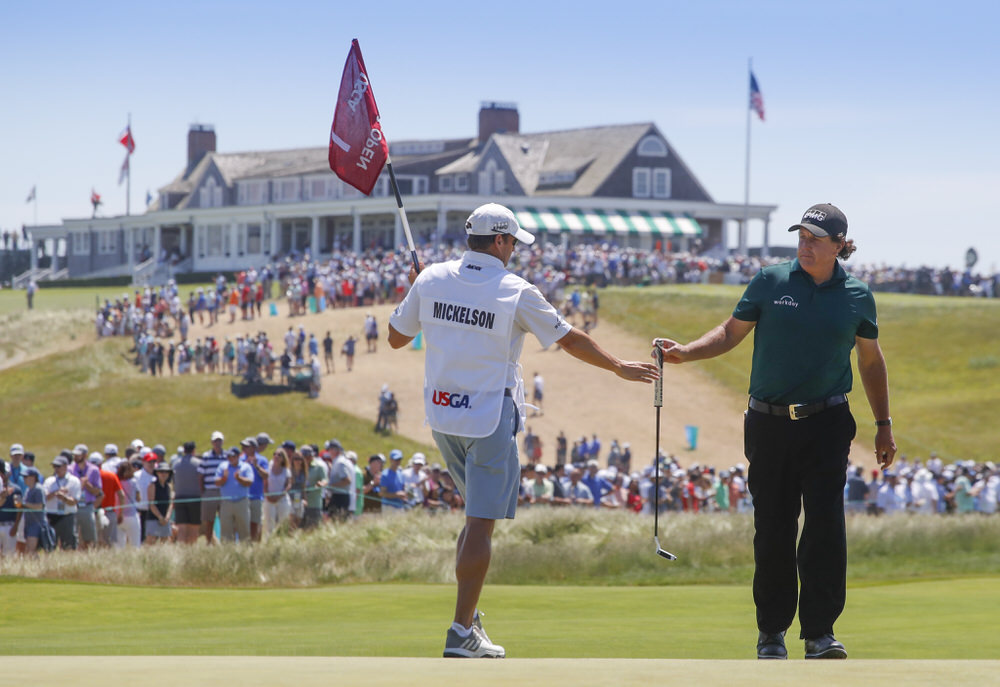
Phil Mickelson plunged the USGA into another bizarre rules kerfuffle when he admitted to deliberately hitting a moving ball on the 13th green en-route to a US Open-wrecking 10.
The rules fiasco was just a sideshow to some on-course carnage as the USGA got its set up wrong again, Shinnecock Hills dried out in the wind and sun and Dustin Johnson, leading by four shots overnight, dropped six shots in his first eight holes before limping to a 77 to end up in a four-way tie for the lead.
Early starters Daniel Berger and Tony Finau fired four-under 66s to set the clubhouse target at three-over par.
Eleven behind starter the day, they were seven shots behind Johnson when the finished but ended the day in the final group, tied for the lead on with Johnson and defending champion Brooks Koepka, who shot a 72.
In common with all the later starters, Justin Rose and Henrik Stenson also suffered as the course got away from the USGA late in the day, the Englishman bogeying two of his last three for a 73 as that leaves him one behind on four-over.
The Swede fared even worse in farcical conditions near the end when the greens became so glassy that some pin positions became overly punishing and he bogeyed four of his last six for a 74 that leaves him two behind the leaders on five-over.
"We felt that it would work well given the forecast we had, but I think that, now that I'm sitting here, we would say that parts of this test of golf simply were too tough," USGA Executive Director Mike Davis said, admiting they got it wrong though not as badly wrong as in 2004, when they lost the seventh green on the final day.
"We want the U.S. Open to be tough, but we saw some examples late in the day where well executed shots were not only not being rewarded, but in some cases penalised," Davis said.
"And specifically, I think the one that was the most troublesome was the 15th green, that hole location. It worked fine most of the day, but it didn't work fine later in the day.
"What happened is we simply got higher winds than we anticipated. The grass really began to dry out. In fact, if you looked at it at the end, it was almost wilting around there, and it just didn't have enough grass to hold the ball up."
He added: "It just, it got windier, and it dried down more than the superintendent here thought, our agronomist thought, and our whole setup team thought... We must slow the course down tonight, and we will."
Despite the brilliance of some of the golf and another hair-raising US Open battle between an on-the-edge USGA course set-up and the world's best, it was Mickelson's 13th hole antics that overshadowed everything, leaving him open to a charge of bringing the game into disrepute.
The left-hander, who was celebrating his 48th birthday yesterday, said he meant no disrespect to the field, his playing partner Andrew "Beef" Johnston and called on his critics to "toughen up", saying he had simply used the rules to his advantage.
Four over on his round after making five bogeys in his previous eight holes, the six-time US Open runner-up chipped off the front of the treacherous 13th green, finishing behind a bunker.
He then chipped 18 feet above the hole, and when his bogey putt appeared certain to trundle off the front of the green again, he broke into a jog and swatted his moving ball back up the tier again as a stunned Johnston looked on.
He missed his next putt for a seven and tapped in for an eight which became a 10 when the USGA gave him with a two-stroke penalty for a breach of Rule 14-5 - Playing Moving Ball.
"Look, I don't mean disrespect by anybody," Mickelson said after signing for an 81 that left him on 17-over.
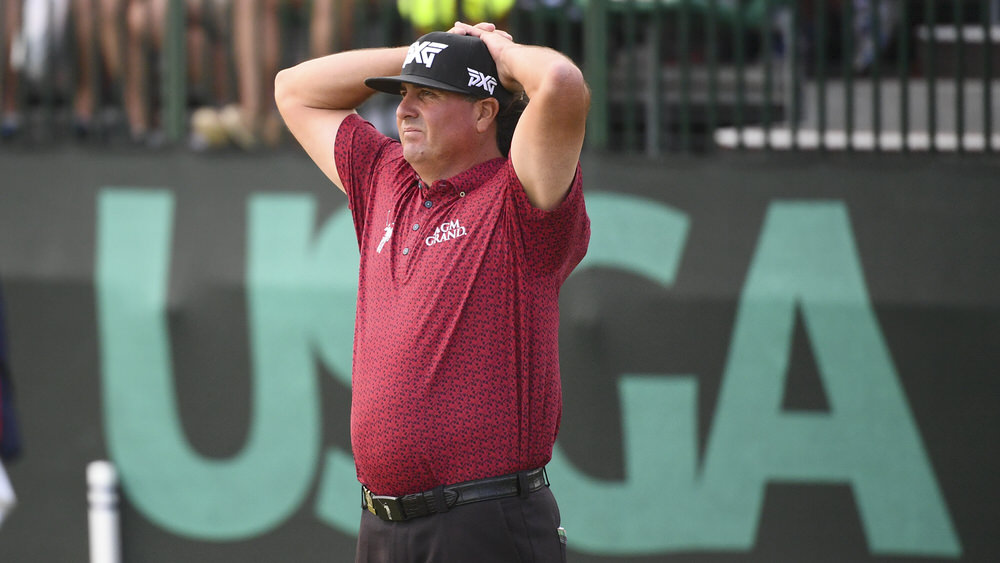

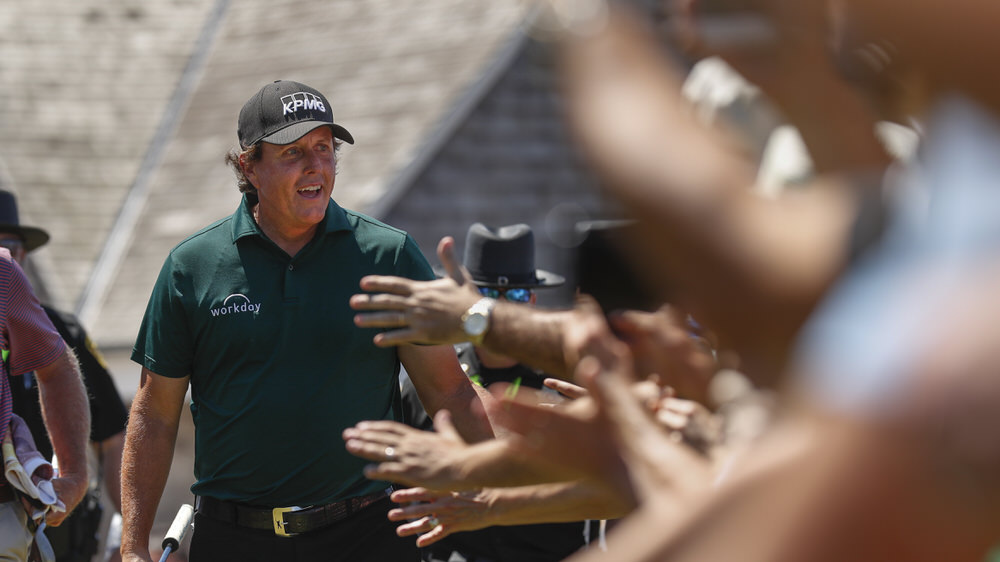
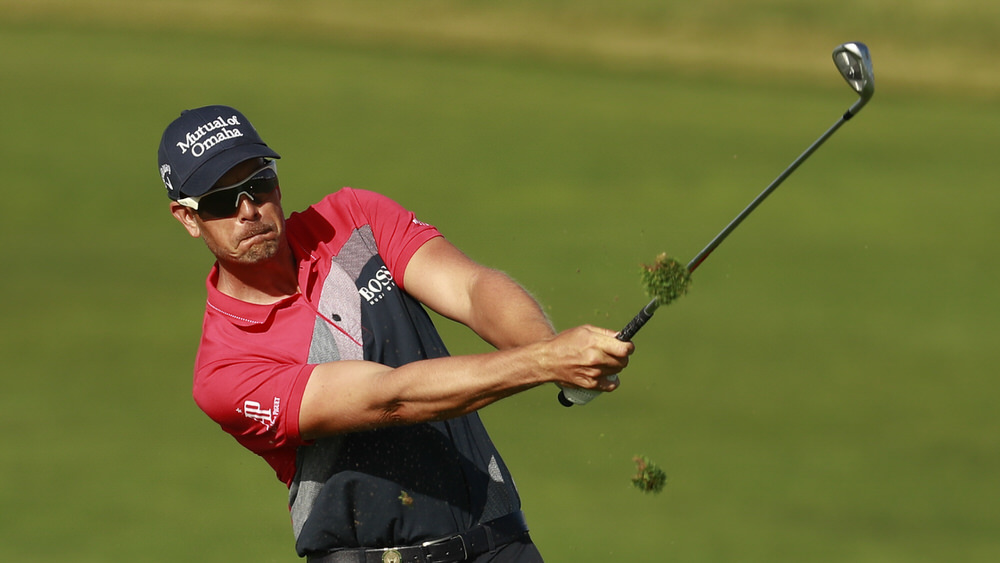
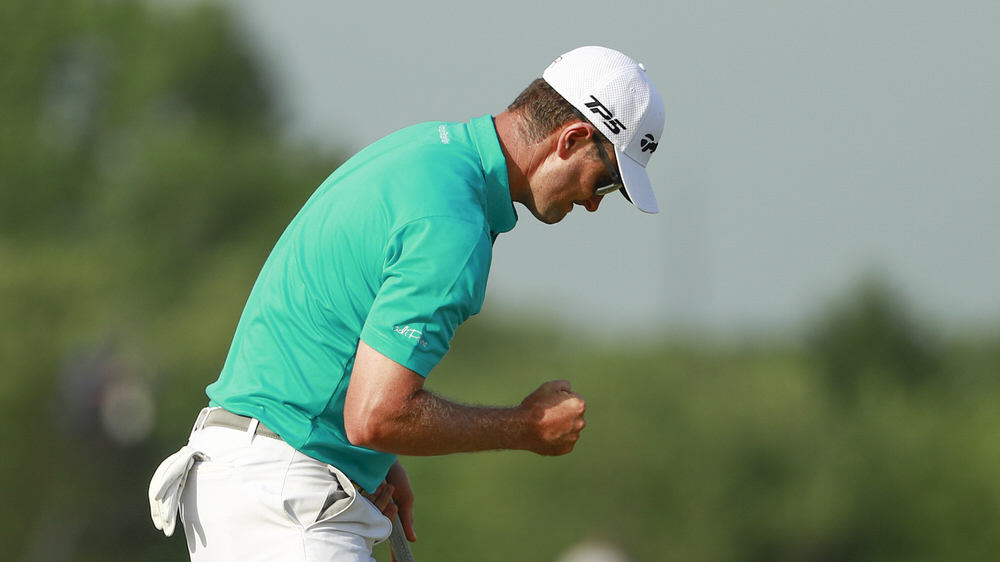
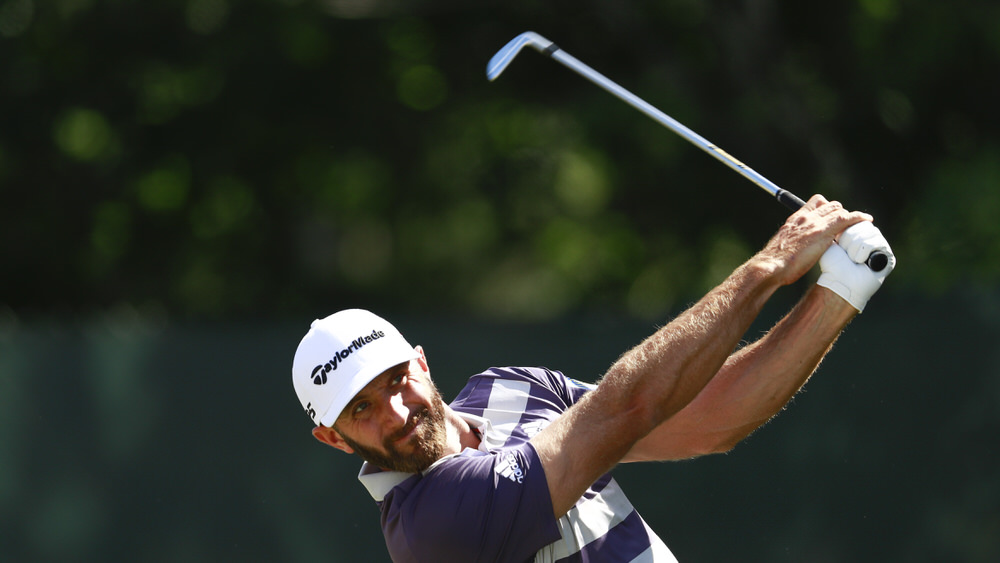
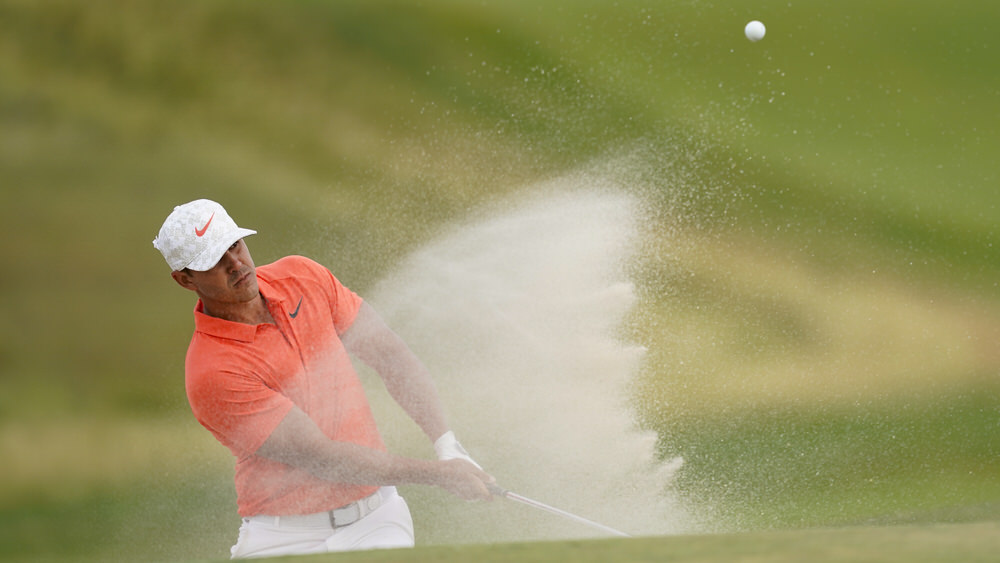
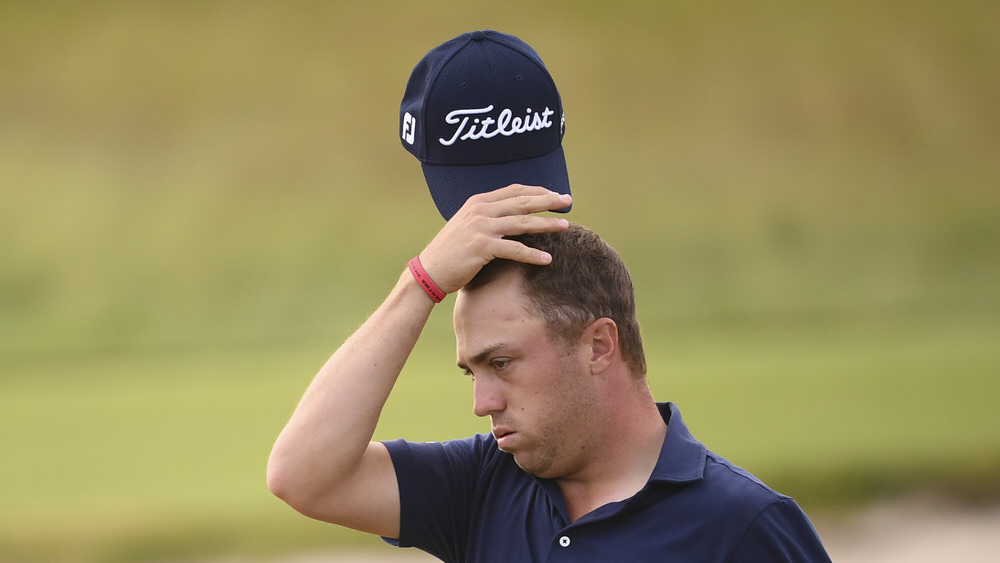
"I know it's a two-shot penalty. At that time I just didn't feel like going back and forth and hitting the same shot over. I took the two-shot penalty and moved on.
"It's my understanding of the rules. I've had multiple times where I've wanted to do that, I just finally did it."
Johnston could only laugh, explaining: "I looked at him, like, ‘Is this actually happening?’ I said, ‘Sorry, but I can’t help but laugh at that. It’s one of the funniest things I’ve ever seen.’ I’ve never seen anything like it."
Mickelson laughed too and smiled to the finish. But a USGA spokesman explained that the Californian was not liable for disqualification for a serious breach of Rule 1-2 — "Exerting Influence on Movement of Ball or Altering Physical Conditions."
"Phil didn't purposely deflect or stop the ball, which is talked about in the reference under Rule 14-5," explained John Bodenhamer, the USGA's Senior Managing Director of Championships and Governance.
"If you look at it, 14-5 explicitly covers a player making a stroke at a moving ball, and so we operated under that rule."
His actions shocked many with former USGA Executive Director David Fay telling Fox Sports: "I probably would have lost ... but I'd have lobbied for disqualification."
Mickelson, who could have allowed the ball to trundle off the green, declare it unplayable and repeat the putt with a one-stroke penalty, dismissed that as not "a great option."
He insisted it wasn't a rush of blood to the head but what is arguably the golfing equivalent of the football's professional foul, could dog him for the rest of his career.
Asked what he'd say to fellow professionals who saw his actions as a manipulation of the rules, he said: "There was a time when I won Sugarloaf back in '06. On the ninth hole, I drove it to the left, and there was water, and a cart path and I didn't have a shot.
"I took relief from the casual water onto the cart path; I took relief from the cart path into the casual water; I did it 11 times, got the ball back to where I had a shot, made par on the hole.
"I think knowing the rules is every bit as important. I don't see how knowing the rules, and using them is a manipulation in any way. No."
He added: "If somebody is offended by that, I apologise to them but, you know, toughen up. This is not meant that way. I just wanted to get onto the next hole, and I didn't see that happening at the time and move on."
Davis and his rules committee cannot rule on a player's intent but on his actions and while Mickelson clearly lost the plot he tried to sound like the smartest man in the room rather than admit that he'd had what Johnston described as "a moment of madness".
He later admitted to Tim Rosaforte in a text that his actions on the 13th where, "not my finest moment" and reached out to the USGA to make sure they fully explained why there was no disqualifaction.
They did just that in a press conference and weighed in with another press release on Sunday morning:
There appears to be some continued uncertainty about the basis of the ruling with Phil Mickelson during the third round of the 118th U.S. Open, and we would like to further clarify previous statements. During play of the 13th hole Mickelson made a stroke on the putting green at his ball which was moving. As a result, he incurred a two-stroke penalty for a breach of Rule 14-5; the stroke made at the moving ball also counted. His score for the hole was 10. Rule 14-5 does not include a serious breach clause or disqualification as part of the penalty statement.
Rule 1-2 did not apply in this situation because Mickelson made a stroke at the ball (defined as the forward movement of the club with the intention of striking at and moving the ball) as opposed to another act to deflect or stop the ball in motion, which are two acts covered by Rule 1-2. Additionally, Exception 1 under Rule 1-2 states that “an action expressly permitted or expressly prohibited by another Rule is subject to that other Rule and not Rule 1-2.” As the act of making a stroke at a moving ball is expressly covered by Rule 14-5, that Rule and the penalty associated with that Rule were applied. The Committee looked at the facts of the situation and determined that there were no grounds under the Rules of Golf for any further penalty, including disqualification.
While all this was going on overnight leader Johnson double-bogeyed the second, then bogeyed the fourth, sixth, seventh and eighth, turning in 41 to slip a shot behind Koepka and Stenson on two-over par.
Stenson also stepped up, playing the front nine in one-under par before conditions deteriorated to such an extent that it became overly demaning and great shots were not holding greens such as the 15th.
Stenson did not mince his words when it came to criticising the USGA.
"They never fail to fail," the Swede said.
Koepka refused to comment on the 15th green.
"I don't have anything nice to say about that green and the pin location, so I'm just not going to say it," he said.
"This afternoon was very tough, obviously, with blowing 20 and a lot of crosswinds. The ball was running out so far on these greens, and, you know, some of these putts, there's just no grass around the hole, so it's hard to stop it. Especially when you get it downhill, downwind, you have no chance of stopping it."
On his chances of wnning back to back, he sounded confident.
"I won this thing last year. I feel really good. My game's in a good spot. I feel like you got to kind of take it from me, to be honest with you."
Johnson was asked if it was the best seven-over round of his career.
"Probably, yeah," he said. "For sure. I mean, I felt like I played pretty well. Couple bad shots, but, I mean, you're going to hit a few bad shots out here. It's just how it goes.
"But, you know, still felt like I gave myself always a good -- you know, a decent look at par. And, you know, three three-putts, that doesn't help. I don't three-putt any today, then I'm right there at even par for the tournament.
"I felt like my speed was pretty good all day. But, you know, the flags were in very difficult spots, and, you know, just made it really difficult with the wind."
He suffered more than most, especially on the front nine, but tried not to sound too negative ahead of today's test.
"I had six or seven putts today that I could have easily putted right off the green," he said. "But, you know, that's what it is. It's the U.S. Open. It's supposed to be tough. There was maybe only one or two flags that I felt like were maybe got a little dicey this afternoon, but the rest of them were fine.
"You had to hit good, quality shots and good putts if you wanted to make a par."






